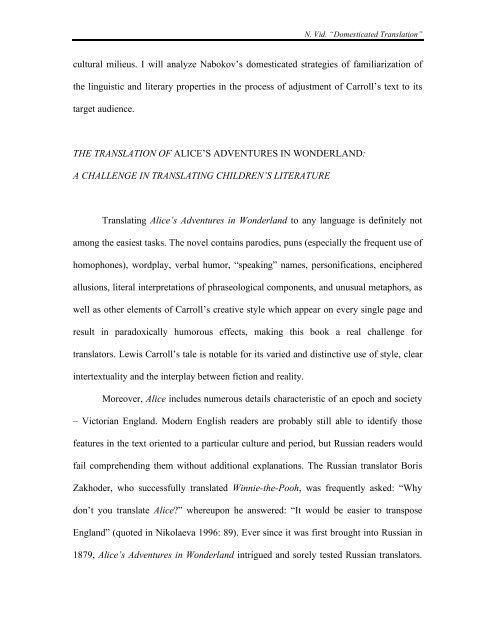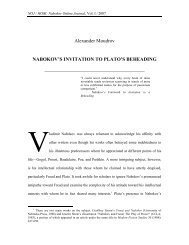domesticated translation: the case of nabokov's translation of alice's
domesticated translation: the case of nabokov's translation of alice's
domesticated translation: the case of nabokov's translation of alice's
Create successful ePaper yourself
Turn your PDF publications into a flip-book with our unique Google optimized e-Paper software.
N. Vid. “Domesticated Translation”<br />
cultural milieus. I will analyze Nabokov’s <strong>domesticated</strong> strategies <strong>of</strong> familiarization <strong>of</strong><br />
<strong>the</strong> linguistic and literary properties in <strong>the</strong> process <strong>of</strong> adjustment <strong>of</strong> Carroll’s text to its<br />
target audience.<br />
THE TRANSLATION OF ALICE’S ADVENTURES IN WONDERLAND:<br />
A CHALLENGE IN TRANSLATING CHILDREN’S LITERATURE<br />
Translating Alice’s Adventures in Wonderland to any language is definitely not<br />
among <strong>the</strong> easiest tasks. The novel contains parodies, puns (especially <strong>the</strong> frequent use <strong>of</strong><br />
homophones), wordplay, verbal humor, “speaking” names, personifications, enciphered<br />
allusions, literal interpretations <strong>of</strong> phraseological components, and unusual metaphors, as<br />
well as o<strong>the</strong>r elements <strong>of</strong> Carroll’s creative style which appear on every single page and<br />
result in paradoxically humorous effects, making this book a real challenge for<br />
translators. Lewis Carroll’s tale is notable for its varied and distinctive use <strong>of</strong> style, clear<br />
intertextuality and <strong>the</strong> interplay between fiction and reality.<br />
Moreover, Alice includes numerous details characteristic <strong>of</strong> an epoch and society<br />
– Victorian England. Modern English readers are probably still able to identify those<br />
features in <strong>the</strong> text oriented to a particular culture and period, but Russian readers would<br />
fail comprehending <strong>the</strong>m without additional explanations. The Russian translator Boris<br />
Zakhoder, who successfully translated Winnie-<strong>the</strong>-Pooh, was frequently asked: “Why<br />
don’t you translate Alice?” whereupon he answered: “It would be easier to transpose<br />
England” (quoted in Nikolaeva 1996: 89). Ever since it was first brought into Russian in<br />
1879, Alice’s Adventures in Wonderland intrigued and sorely tested Russian translators.
















